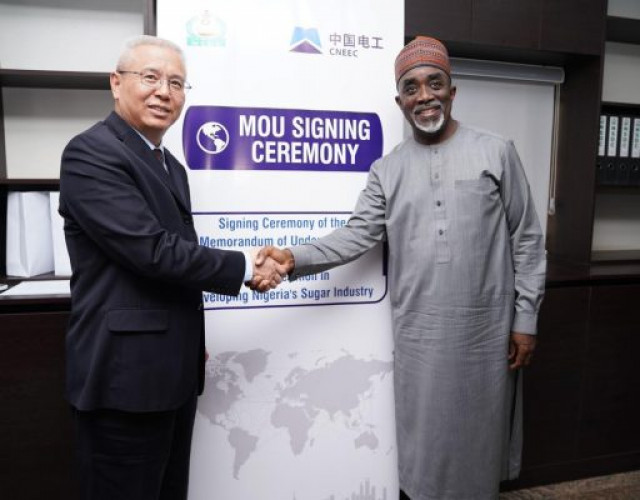ABUJA, Nigeria - The National Sugar Development Council (NSDC) has entered into a memorandum of understanding (MoU) with SINOMACH, a Chinese conglomerate, to establish a sugarcane cultivation and processing initiative that aims to produce one million metric tonnes of sugar.
This MoU marks one of the initial outcomes of the Nigeria-China Strategic Partnership, an initiative by President Bola Ahmed Tinubu, and could potentially draw in investments totaling up to $1 billion into the sugar sector.
Under the agreement, SINOMACH will begin by building a sugar production facility and a sugarcane plantation with a yearly production capability of 100,000 metric tonnes, while the NSDC will help secure the required authorisations, permits, and approvals for the project. This initiative could significantly more than double Nigeria's current annual sugar production.
SINOMACH is anticipated to leverage its extensive expertise, resources, and experience in executing the project on an engineering, procurement, and construction (EPC) basis, with the key advantage being that the Chinese conglomerate will finance the initiative.
During the signing ceremony in Abuja, NSDC's Executive Secretary/CEO, Kamar Bakrin, stated that 2025 is expected to be a crucial year for Nigeria's developmental efforts.
He remarked: “This is a key period where we aim to achieve significant advancements in our national quest for economic self-sufficiency and food security, particularly given the financial pressures Nigeria faces.
A thriving sugar industry will provide numerous advantages to Nigeria, including the creation of thousands of sustainable jobs throughout the supply chain. Sugar cultivation inherently promotes extensive rural infrastructure development. For Nigeria, it will also lead to considerable foreign exchange savings by decreasing reliance on imports, which presently constitute the majority of the country's sugar consumption.
“We envision a fully developed sugar sector that will set a template for Nigeria’s wider industrial strategy. China, as a frontrunner in industrialization, can easily connect with this vision.
We believe the sugar industry can serve as an illustrative example, allowing us to pursue a creative and transformative approach to achieving significant scale and speed essential factors for Nigeria's advancement.
Key strategies we believe can be successfully executed in the sugar sector then replicated across Nigeria’s industrialisation journey include a strategic sector development approach, establishment of supportive policy frameworks, effective aggregation of essential production inputs, acquisition of technical skills and expertise, as well as innovative financing solutions.”
He noted that the signing signifies the start of a potential long-term partnership capable of producing as much as one million metric tonnes of locally manufactured sugar, thereby enhancing the nation's domestic production capabilities and minimizing import reliance.
“This unique model combines EPC with development financing an indispensable requirement for agrarian industrial growth in the nation,” Bakrin added.
Additionally, Li Xiao Yu, the Vice President of SINOMACH, expressed admiration for Nigeria's vigorous pursuit of the National Sugar Master Plan (NSMP) aimed at achieving sugar production self-sufficiency, referring to it as commendable.
“We strongly admire this vision it represents not just an industrial policy, but a significant movement linked to food sovereignty and economic dignity.
We firmly believe that, through collaborative efforts, the successful implementation of the plantation and sugar mill initiative will improve Nigeria’s sugar self-sufficiency, stimulate economic progress in surrounding regions, generate substantial employment opportunities, modernize the agricultural value chain, and provide enduring social benefits.
“We regard our partnership with the NSDC not just as a commercial initiative, but as a tangible step towards realizing the common vision of our two Heads of State to strengthen agricultural cooperation and encourage shared development,” he stated.




















